Best conversational AI agents
Conversation is one of the most powerful tools at our disposal. It builds trust and strengthens relationships — which is why it’s key for creating connections with customers and employees alike.
Thanks to conversational AI agents, organizations can have personalized conversations at scale. These artificial intelligence tools simulate real-time human interactions to solve problems, answer questions, and enhance the customer experience by streamlining employee workflows.
In this article, we share the top 15 conversational AI agents currently on the market, as well as their key benefits — so let’s start talking.
What are conversational AI agents?
Conversational AI agents are AI tools that enable users to have human-like conversations with chatbots or virtual assistants to get answers to common questions, resolve issues, and access additional information. These interactions can be done through text, voice, or video, and can be used in several business sectors, such as education, healthcare, e-commerce, and beyond.
But while you may already be familiar with AI-powered chatbots, virtual assistants, and conversational agents, there are some key differences between them:
- AI chatbots engage with users via written text, solving simple rules-based problems
- AI virtual assistants can perform simple administrative tasks given with voice prompts
- Conversational AI agents handle complex issues and provide highly personalized responses
Benefits of conversational AI agents
Conversational AI tools — which include intelligent virtual agents, chatbot technology for websites and social media, and virtual assistants — offer organizations several key benefits to help them save time, energy, and money:
- 24/7 availability: Both customers and employees can interact with AI tools day or night, 365 days a year.
- Scalability: Tools can scale up to meet increased demands, serving hundreds of thousands of users.
- Cost-effectiveness: You don’t need to hire additional support staff or pay AI chatbots for working overtime.
- Personalized responses: Conversational AI can provide a more engaging customer service experience based on user prompts.
- Insightful data collection: AI can collect useful data from customers and employees, which organizations can use to improve the business.
These benefits enable the organization to enhance the customer experience, providing better service and support at all hours of the day. Employees also benefit from having such tools, as they can focus on more strategic tasks that require a human touch. The result? Increased sales, reduced expenses, and higher profitability.
The best conversational AI agents
1. Jotform AI Agents
If your organization uses forms to collect data, whether from clients, patients, students, employees, or anyone else, you could benefit from using Jotform AI Agents. Jotform AI Agents allow you to create conversational AI agents from your online forms. They’re incredibly easy to use — simply select a form, train the AI, and customize it with the agent builder.
- Best for: Form-based organizational processes
- Developer: Jotform
- Key features: No-code AI agent builder, vast AI agent directory with conversational AI agent templates, simple AI training process with organizational documents and websites
- Pros: Jotform comes with several conversational AI agents, such as the Hospice Care Coordinator Agent that answers questions and helps relatives fill out complex forms, and the School Administrator Agent that communicates with parents and automates administrative tasks
- Cons: Organizations can’t use conversational AI agents without an online form
- Plans/pricing: Jotform AI Agents has a free plan and three paid plans starting from $34 per month that provide access to the entire Jotform ecosystem of products; there is also a custom Enterprise plan
- G2 rating: 4.7/5
Build Your Custom AI Agent in Minutes
2. ElevenLabs Conversational AI
ElevenLabs Conversational AI is a platform that enables you to add voice to web, mobile, and telephone agents — making your customer support interactions more personable and human-like.
- Best for: Voice-based conversational AI agents
- Developer: ElevenLabs
- Key features: Ultra low-latency, high-quality voice options, speech-to-text and text-to-speech options, 31-plus languages
- Pros: This platform comes with thousands of voice options and also allows you to clone your voice
- Cons: Some users have noted that the voice can glitch from time to time, requiring regeneration, sometimes the voice ignores punctuation and speeds through sentences
- Plans/pricing: ElevenLabs Conversational AI has a free trial with paid plans starting from $4.17/month with discounts for higher volumes
- G2 rating: 4.7/5
3. Intercom
Fin AI by Intercom is an AI agent for customer service, offering organizations the ability to scale customer conversations and improve customer experiences.
- Best for: Frontline customer support
- Developer: Intercom
- Key features: 45-plus languages, AI-generated insights from conversations, instant training from organizational knowledge sources
- Pros: Intercom Fin can personalize service for each customer conversation, resolving issues with a 99.9 percent accuracy rate
- Cons: Some users have found the solution doesn’t work well for smaller organizations, there are some feature limitations in customizing reports and analytics
- Plans/pricing: Intercom Fin has a free trial, and paid usage costs $0.99 per resolution
- G2 rating: 4.5/5
4. D-iD AI Agents
D-iD AI Agents is a generative AI tool that enables organizations to create a visual AI agent for face-to-face conversations with users.
- Best for: Face-to-face digital interaction
- Developer: D-iD
- Key features: AI agent appearance selection, personalization with internal knowledge bases, 90 percent accuracy in agent responses
- Pros: D-iD AI Agents use retrieval augmented generation technology, so they are not bound by the language limitations of large language models
- Cons: Some users have noted that the voice cloning features aren’t accurate, its voice modulation and multilingual capabilities could use some improvement
- Plans/pricing: D-iD AI Agents has a free 14-day trial, plus three paid plans starting at $4.70 per month with unlimited video minutes for the first month; there is also a custom enterprise-level plan
- G2 rating: 4.6/5
5. Replicant
Replicant is a conversational AI platform that autonomously resolves customer service issues at scale for contact and call centers.
- Best for: Contact center automation
- Developer: Replicant
- Key features: 35-plus languages, proprietary AI model, voice, chat, and SMS support
- Pros: Replicant uses AI guardrails to prevent hallucinations in conversations, ensuring customers get accurate information every time
- Cons: Some users have noted that the product offering is expensive compared to other options, international organizations require more language and accent support
- Plans/pricing: Replicant offers flexible pricing; contact them for more details
- G2 rating: 4.7/5
6. Kustomer
Kustomer is an AI-powered customer service CRM platform enabling organizations to offer high support volumes with optimized customer experience.
- Best for: High-volume customer support and service
- Developer: Kustomer
- Key features: AI-assisted customer conversations, triaging and routing for customer issues, detailed performance reporting
- Pros: Kustomer enables organizations to build custom workflows for responding to specific types of customer engagements
- Cons: Some users have noted a latency issue when a high number of customers are using the platform at one time, the professional plan has limited data storage for customer information
- Plans and pricing: Kustomer has a SaaS pricing model per conversation, and three pricing tiers; contact Kustomer for pricing information
- G2 rating: 4.4/5
7. Leena AI
Leena AI is an employee assistant for IT, HR, and finance tickets, helping organizations transform scattered processes into streamlined workflows.
- Best for: Employee tickets
- Developer: Leena AI
- Key features: Multi-app tasks completed with a single prompt, multichannel support for existing organizational communication channels, 100-plus languages
- Pros: Leena AI Autonomous Agent guarantees a 70 percent self-service ratio for ticket resolution
- Cons: Some users would like to have more customization capabilities for the bot, the platform’s responses are lacking in emotional intelligence
- Plans/pricing: Leena AI offers a free trial; contact the company for plans and pricing information
- G2 rating: 4.6/5
8. Voiceflow
Voiceflow is an AI agent builder and deployment platform for automating customer experiences.
- Best for: Building custom customer support agents
- Developer: Voiceflow
- Key features: Library of agent templates, agent-building community resources, Voiceflow agent-building experts available
- Pros: Nontechnical builders can get up and running quickly with the intuitive user interface
- Cons: Some users would like to see more integrations with social media and messaging apps, the Pro plan has a limit of 20 agents, which isn’t enough for many organizations
- Plans/pricing: Voiceflow has a free plan with two agents, two paid plans starting at $50 per month per editor for 20-plus agents, and a custom enterprise-level plan
- G2 rating: 4.7/5
9. Conversica
Conversica is a conversational agent platform for revenue teams, moving buyers through the sales funnel.
- Best for: Sales team workflow optimization
- Developer: Conversica
- Key features: Turnkey AI dialogue, multiple large language models including GPT, multilingual and omnichannel support
- Pros: Conversica has a natural, human-like conversation style
- Cons: Some users note that it works best for single-item sales rather than product ranges, it has limited customization features
- Plans/pricing: Contact Conversica for pricing details
- G2 rating: 4.5/5
10. Sierra
Sierra is a conversational AI platform organizations can use to create a custom AI agent that offers personalized service to customers.
- Best for: Creating custom conversational AI agents with an empathetic tone
- Developer: Sierra
- Key features: AI agent aligned with brand voice and tone, empathetic conversational style, voice option available
- Pros: Sierra can integrate with your existing tech stack, such as your call center ecosystem
- Cons: Some users have found the UI unintuitive for beginners; it’s better for short, succinct conversations rather than long, complex ones
- Plans/pricing: Contact Sierra for pricing information
- G2 rating: 4.3/5
11. Mopo
Mopo is an enterprise AI agent that accelerates the customer journey through the funnel and enhances the customer experience.
- Best for: Sales pipeline acceleration
- Developer: Mopo
- Key features: Natural language search and chat, intuitive next-suggested questions for users, conversation linking to CRM
- Pros: Mopo can monitor customer conversations with AI live so human agents can step in where needed
- Cons: Mopo pricing may be inaccessible for smaller organizations, it’s designed for enterprise organizations, so it doesn’t work as well for small and medium-sized businesses
- Plans/pricing: Contact Mopo for pricing details
- G2 rating: N/A
12. Yellow.ai
Yellow.ai offers customer service automation for enterprise organizations, enhancing efficiency and streamlining processes.
- Best for: Global customer service automation
- Developer: Yellow.ai
- Key features: Voice, chat, and email options, in-house large language models, up to 90 percent automation
- Pros: Yellow.ai can communicate with customers in 135-plus global languages
- Cons: Some users note that the pricing structure can be cumbersome for organizations with small budgets, the analytics module needs more features and customization options
- Plans/pricing: Yellow.ai has a basic free plan with one bot and an Enterprise plan with unlimited bots; contact Yellow.ai for pricing details
- G2 rating: 4.4/5
13. Play.AI
Play.AI is an artificial intelligence voice platform that organizations can use to build voices for text-to-speech models, voice agents, copilots, and more.
- Best for: AI voices for conversational agents
- Developer: Play.AI
- Key features: Range of voice models, voice cloning abilities, text-to-speech options
- Pros: Play.ai voices can handle complex acronyms and number sequences
- Cons: The free plan only includes 30 minutes of speech credits, it could use support in additional global languages
- Plans/pricing: Play.AI has a free plan with limited features and access, plus three paid plans starting at $9 per month with 50-plus minutes of speech credits
- G2 rating: N/A
14. Parloa
Parloa is a conversational AI platform that uses Microsoft Speech Recognition to deliver an exceptional customer experience.
- Best for: Large teams of AI customer service agents
- Developer: Parloa
- Key features: Phone, chat, email, and in-app options, highly scalable, low-code design platform
- Pros: Parloa offers large-scale testing so you can simulate thousands of interactions at once to train your AI
- Cons: Parloa’s complexity requires a resource-intensive setup and implementation, it’s an enterprise-grade platform that may not be a good fit for smaller organizations
- Plans/pricing: Contact Parloa for plans and pricing information
- G2 rating: 4/5
15. Kore.ai
Kore.ai is an enterprise-level conversational AI platform with a no-code user interface for internal- and external-facing AI agents.
- Best for: Multitasking AI agents to increase employee efficiency
- Developer: Kore.ai
- Key features: Intelligent agents that can complete complex, multi-step tasks, pre-built agent templates for HR, IT, and more, no-code tools
- Pros: Kore.ai has pre-built prompts to further increase productivity
- Cons: The platform may be too complex and robust for smaller organizations looking for a simple solution, its voice interaction capabilities need improvement
- Plans/pricing: Kore.ai has two paid plans starting at $50 per month for 1,000 sessions, plus a customer enterprise-level plan
- G2 rating: 4.7/5
Challenges of using conversational AI agents
Even the best AI chat agents and virtual assistants come with their own challenges. Here are some issues you may encounter when using conversational AI technology:
- Language processing problems: Some tools may not understand user prompts and questions, especially complex or multi-phrase sentences.
- Lack of emotional intelligence: AI tools don’t have empathy, which can be problematic when dealing with frustrated or upset customers. However, some tools can mimic empathetic responses.
- Integration issues: Your conversational AI tools need to sync with your tech stack. Be sure to check integration and API options from the start.
- Maintenance complexities: Many conversational AI tools, especially enterprise-grade ones, can be difficult to set up and maintain, so may require specialized expertise.
- Customization limitations: If you have very specific business use cases, you may not find the customization features you need to create the ideal AI agent.
Keep these challenges in mind as you select which conversational AI agent to use. And before committing to any one platform be sure to
- Look at customer reviews to learn about the experiences of other organizations
- Take advantage of free plans and trials
- Book a demo to explore the tool firsthand
- Speak to the sales and customer service teams
Start the conversation with Jotform AI Agents
Conversational AI agents are a powerful tool in your arsenal, allowing you to enhance the customer experience, streamline employee workflows, increase organizational productivity, and so much more. And if your business relies on form-based processes, the best choice is undoubtedly Jotform AI Agents.
With Jotform AI Agents, you can turn a regular online form into a dynamic conversational experience. The training process is simple — simply select a form, and provide the AI with your business process documents or URLs.
Plus, Jotform’s no-code user interface is highly intuitive, so anyone on your team — tech-savvy or not — can build their custom conversational AI agent from scratch or modify a template from the AI Agent Directory. We have templates for many industries, such as the Real Estate Consultant Agent (which helps users find their dream homes), the Hospice Care Coordinator Agent (which helps relatives fill out important forms), and the School Administrator Agent (which automates various administrative tasks within educational institutions).
The best part? Jotform AI Agents has a free plan, so you can get started right away. Explore the tool and see how quickly it can improve your operations.
Photo by Timur Weber



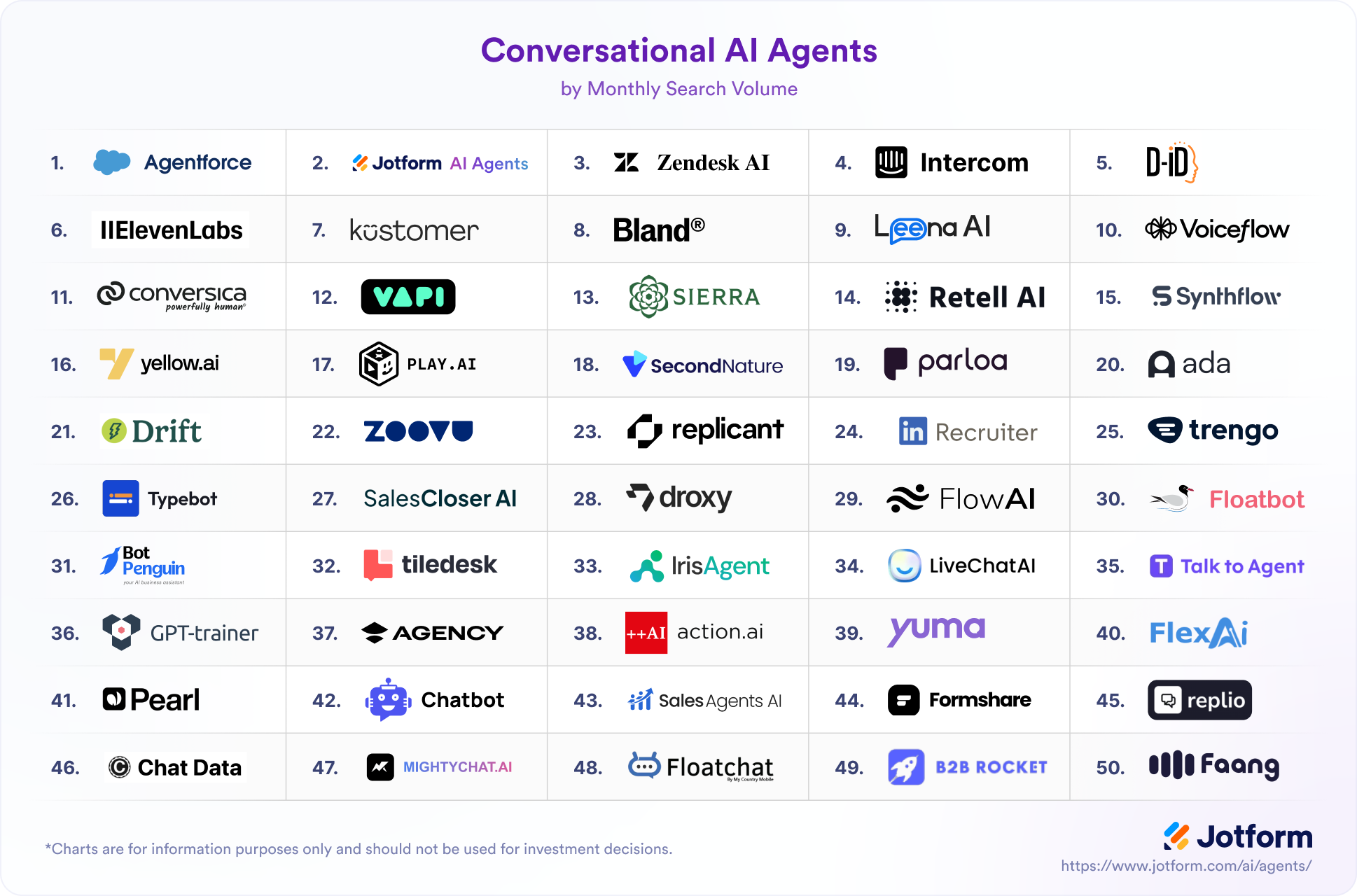
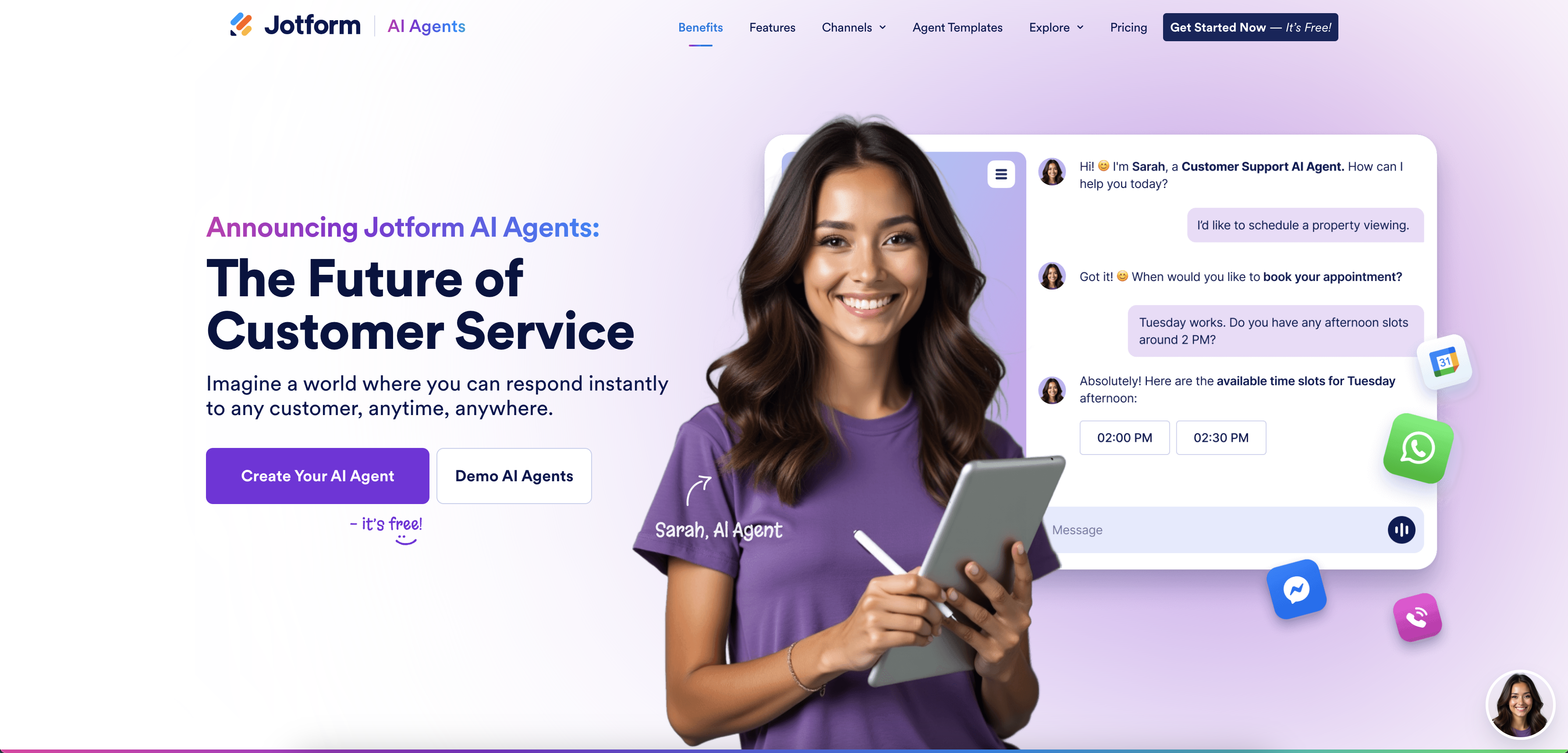
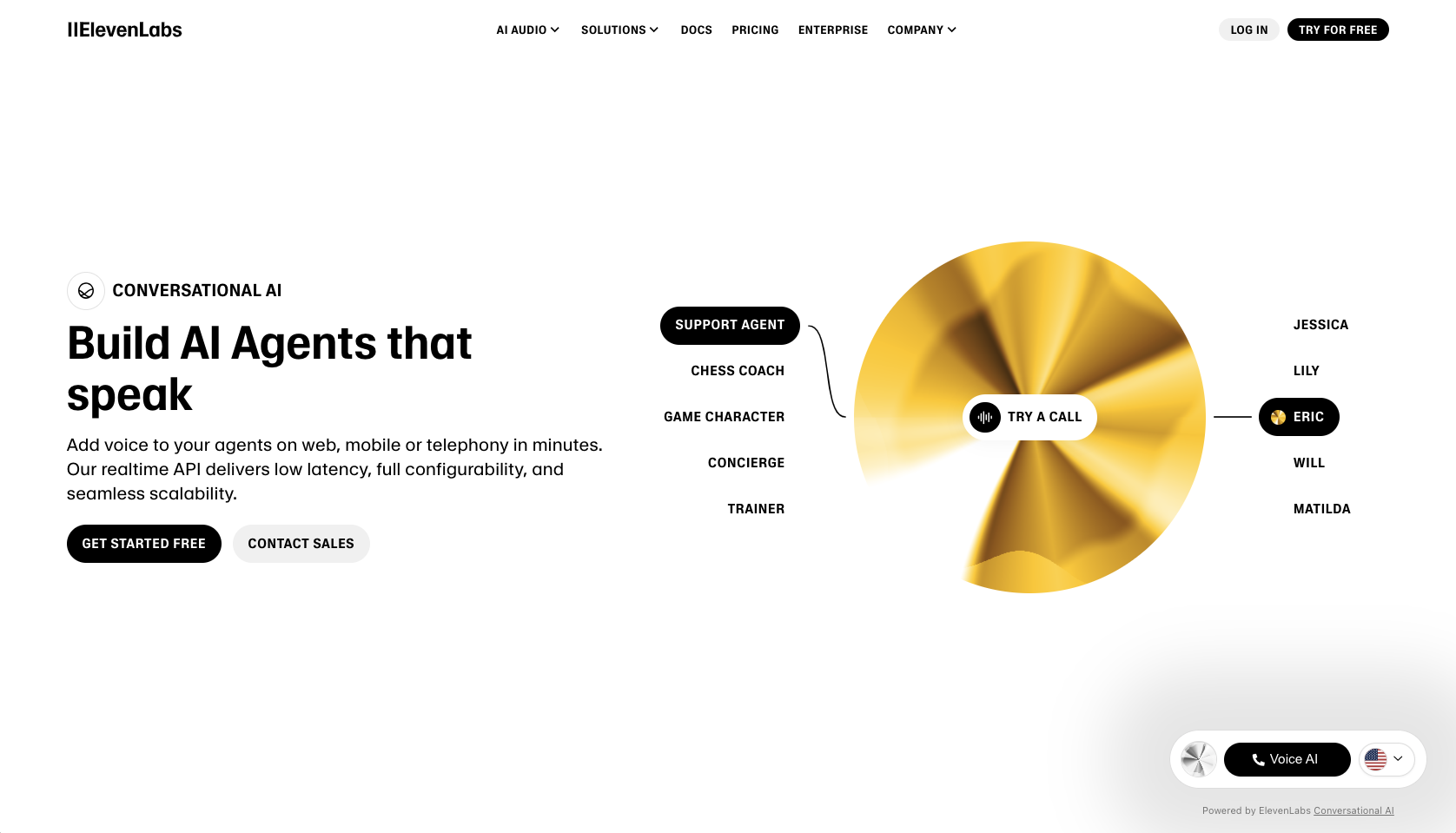
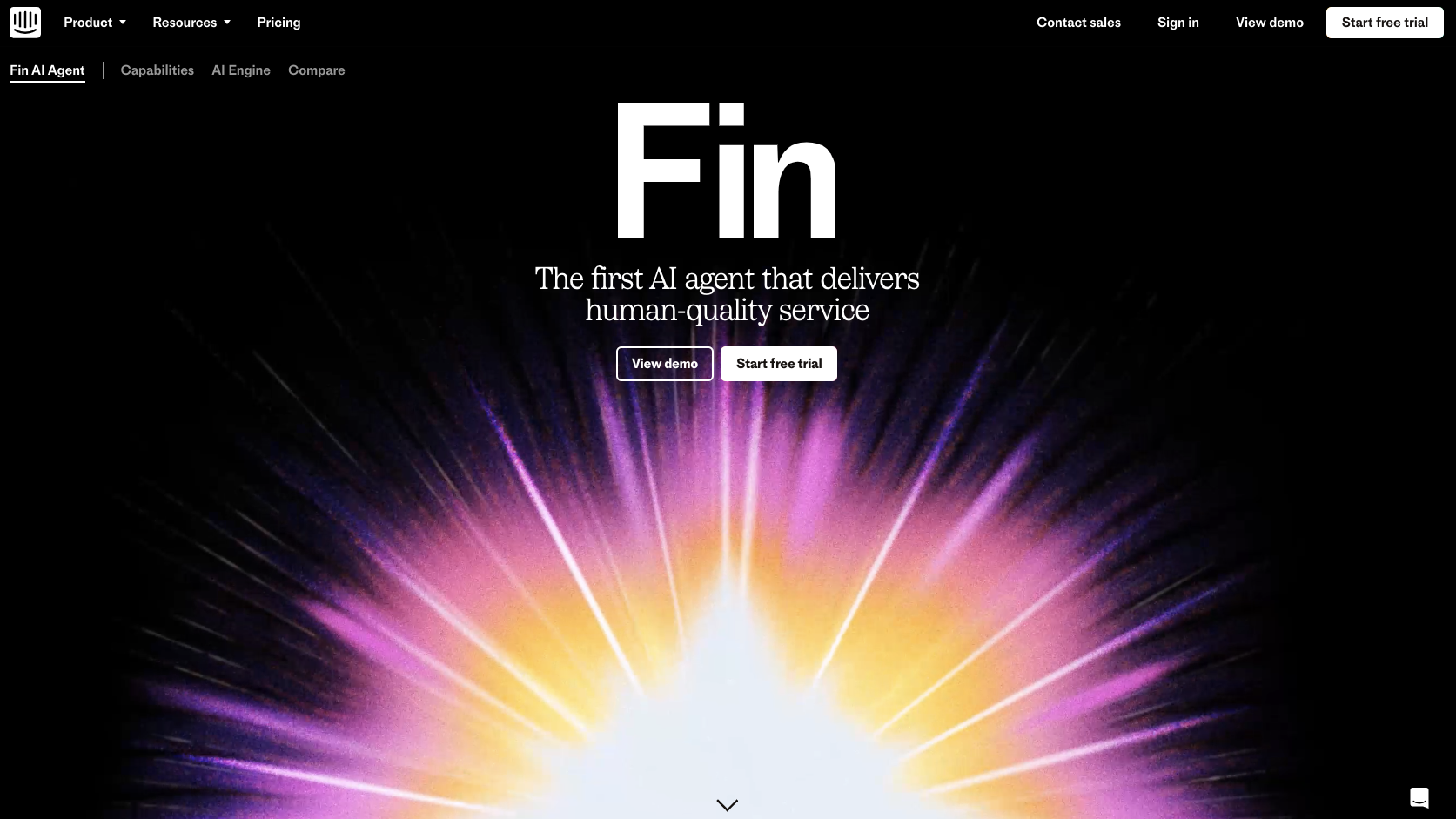

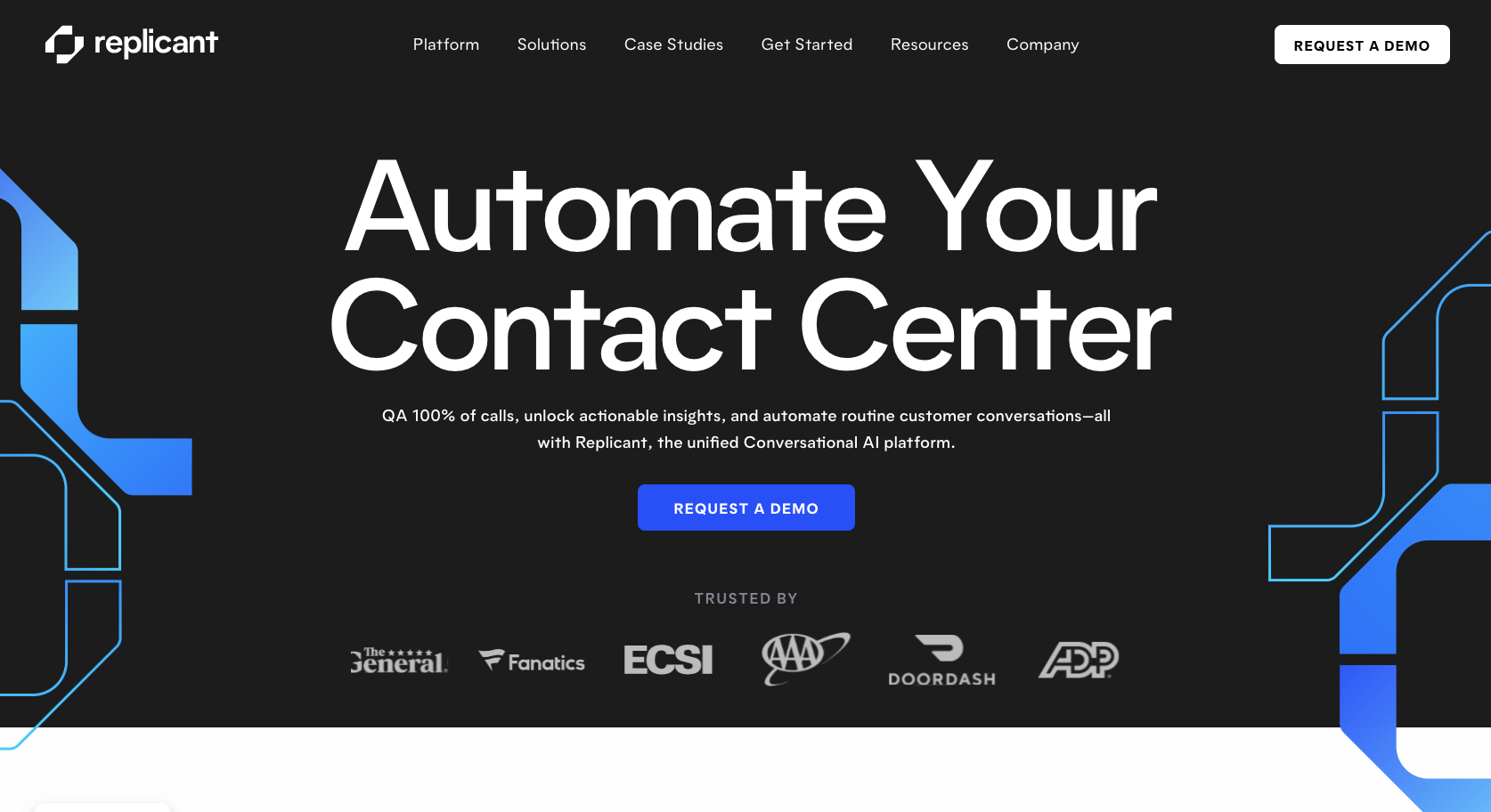
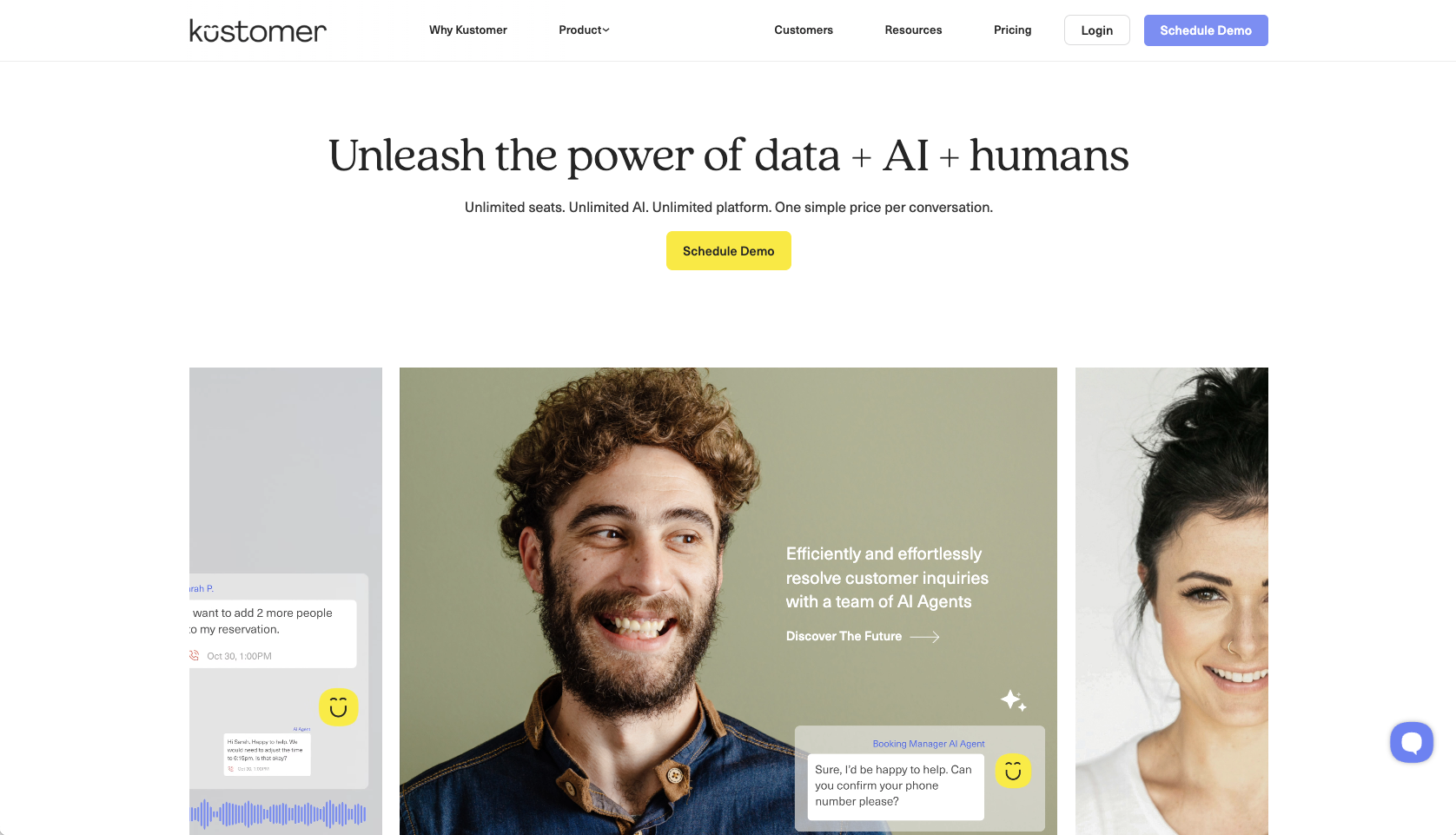
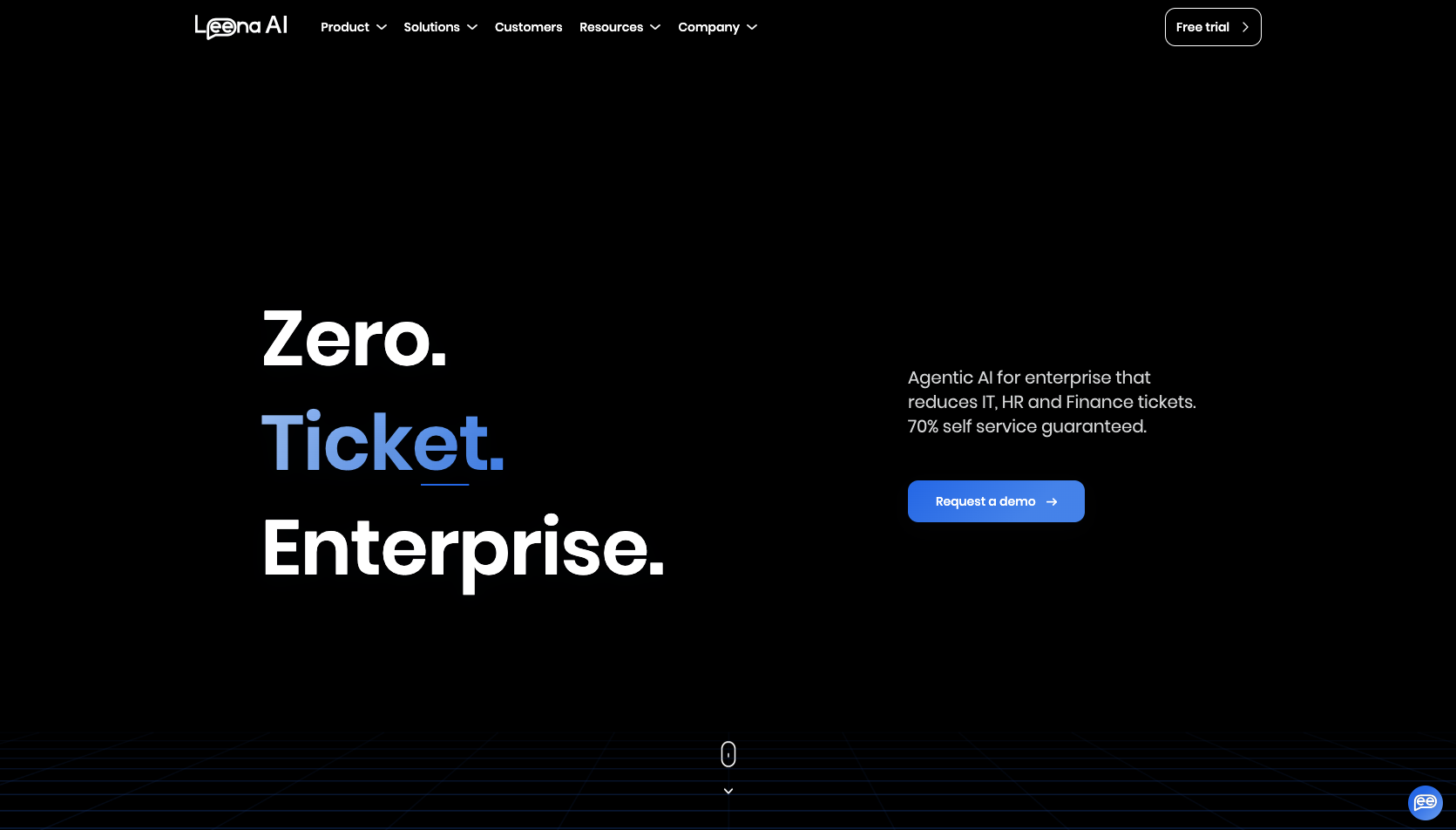


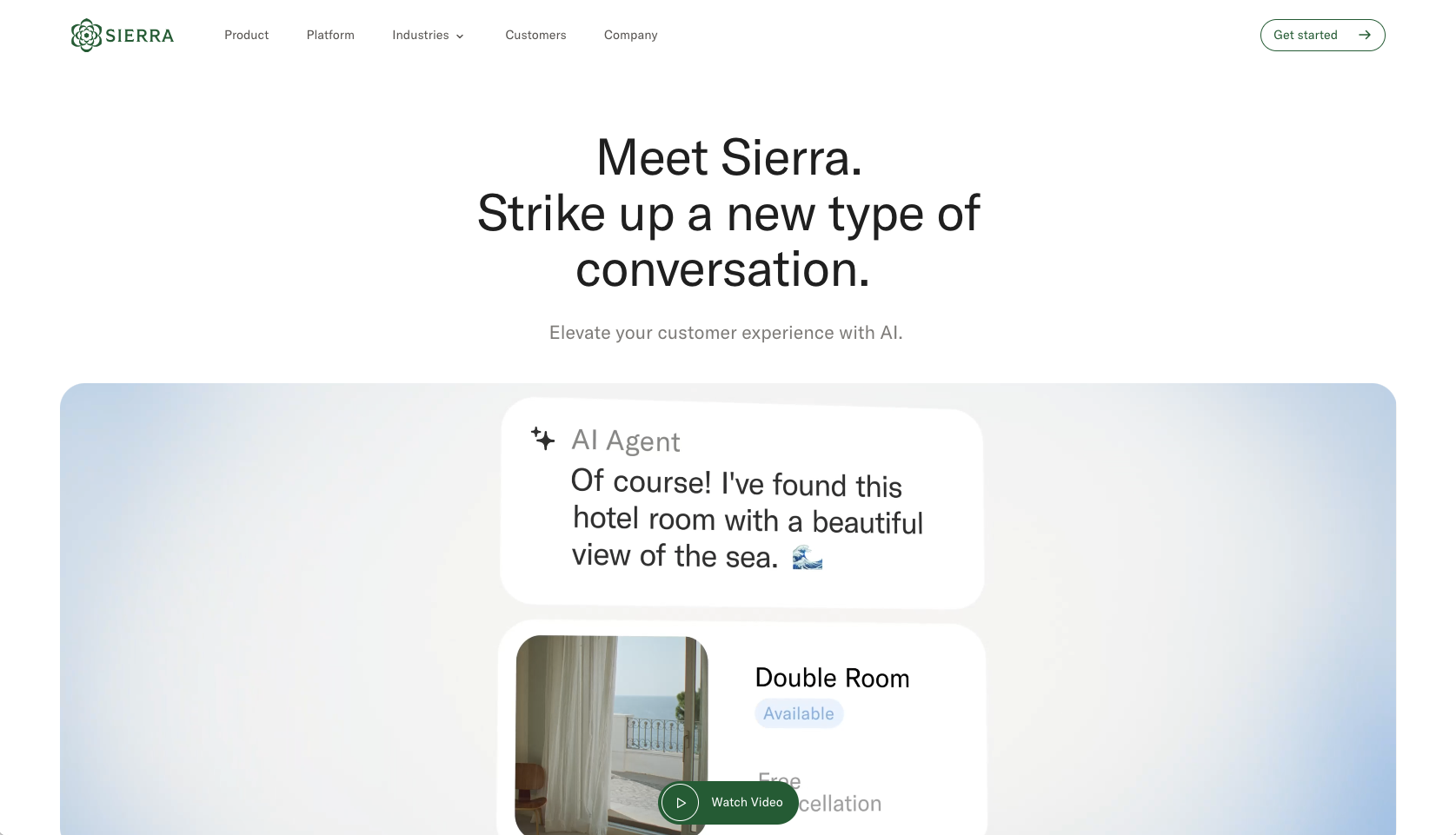
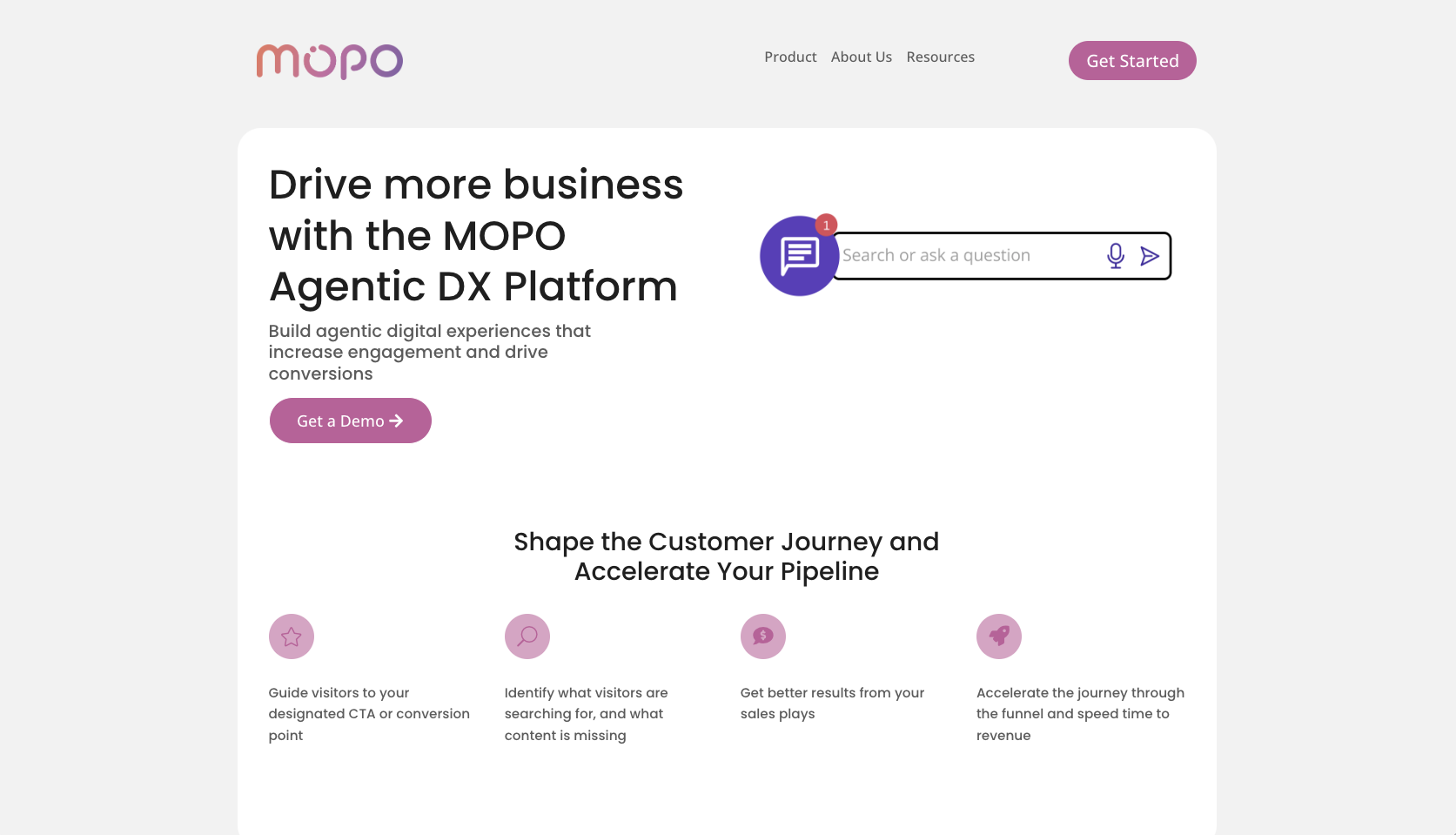



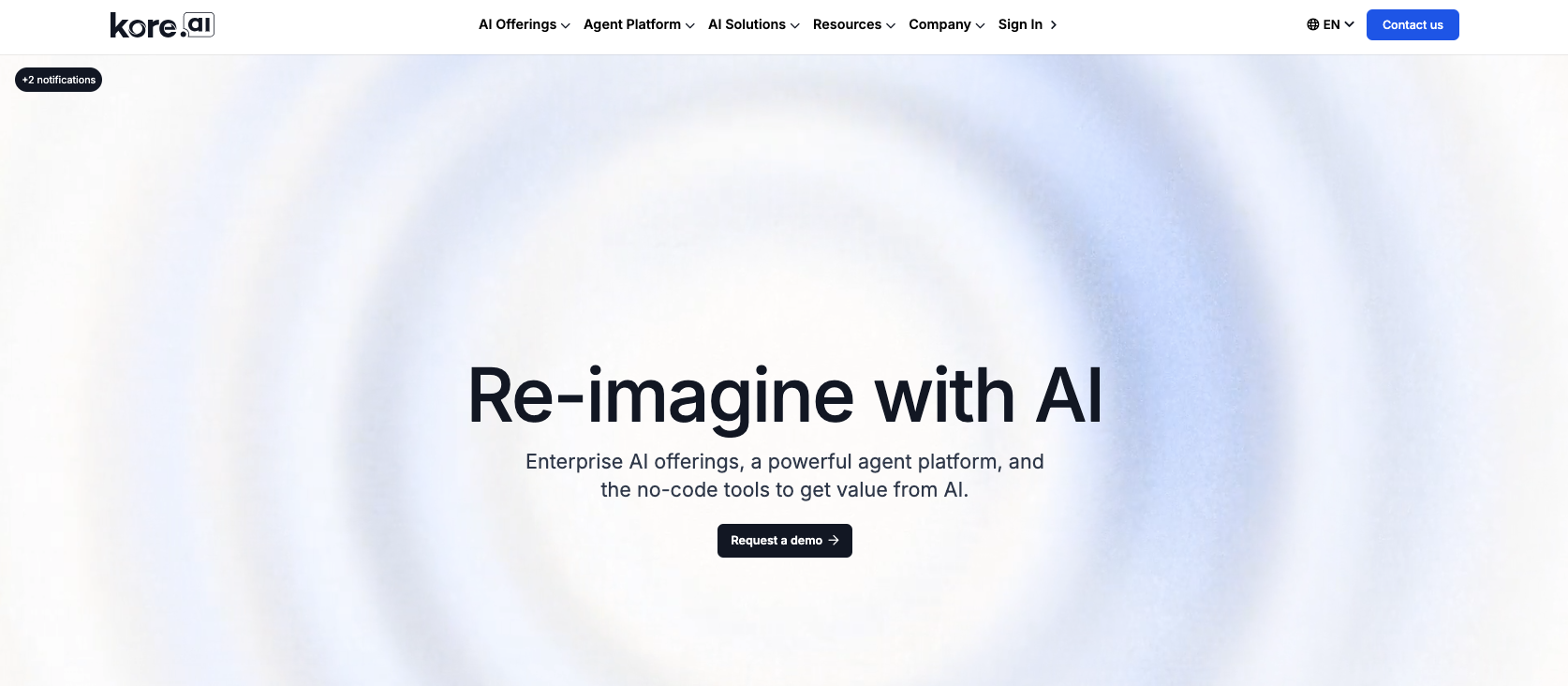






































































































Send Comment: